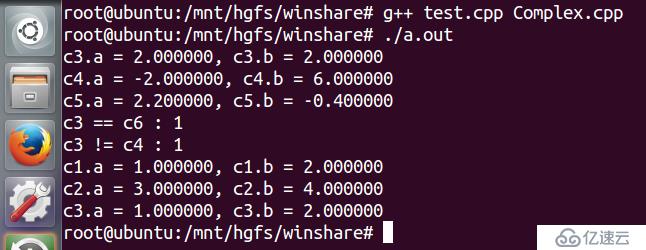我们在之前已经是实现了复数类的相加操作,那么我们今天就来完善下复数类。一个完整的复数类应该具备的操作有:运算(+, -, *, /);比较(==, !=);赋值(=);求模(modulus);利用的就是操作符重载来统一实现复数与实数的运算和比较方式。复数类的实现如下
Comlpex.h 源码
#ifndef _COMPLEX_H_
#define _COMPLEX_H_
class Complex
{
double a;
double b;
public:
Complex(double a = 0, double b = 0);
double getA();
double getB();
double modulus(const Complex& c);
Complex operator + (const Complex& c);
Complex operator - (const Complex& c);
Complex operator * (const Complex& c);
Complex operator / (const Complex& c);
bool operator == (const Complex& c);
bool operator != (const Complex& c);
Complex& operator = (const Complex& c);
};
#endifComplex.cpp 源码
#include "Complex.h"
#include <math.h>
Complex::Complex(double a, double b)
{
this->a = a;
this->b = b;
}
double Complex::getA()
{
return a;
}
double Complex::getB()
{
return b;
}
double Complex::modulus(const Complex& c)
{
return sqrt(a * a + b * b);
}
Complex Complex::operator + (const Complex& c)
{
double na = a + c.a;
double nb = b + c.b;
Complex ret(na, nb);
return ret;
}
Complex Complex::operator - (const Complex& c)
{
double na = a - c.a;
double nb = b - c.b;
Complex ret(na, nb);
return ret;
}
Complex Complex::operator * (const Complex& c)
{
double na = a * c.a - b * c.b;
double nb = a * c.b + b * c.a;
Complex ret(na, nb);
return ret;
}
Complex Complex::operator / (const Complex& c)
{
double cm = c.a * c.a + c.b * c.b;
double na = (a * c.a + b * c.b) / cm;
double nb = (b * c.a - a * c.b) / cm;
Complex ret(na, nb);
return ret;
}
bool Complex::operator == (const Complex& c)
{
return (a == c.a) && (b == c.b);
}
bool Complex::operator != (const Complex& c)
{
return !(*this == c);
}
Complex& Complex::operator = (const Complex& c)
{
if( this != &c )
{
a = c.a;
b = c.b;
}
return *this;
}test.cpp 源码
#include <stdio.h>
#include "Complex.h"
int main()
{
Complex c1(1, 2);
Complex c2(3, 4);
Complex c3 = c2 - c1;
Complex c4 = c1 * c3;
Complex c5 = c2 / c1;
printf("c3.a = %f, c3.b = %f\n", c3.getA(), c3.getB());
printf("c4.a = %f, c4.b = %f\n", c4.getA(), c4.getB());
printf("c5.a = %f, c5.b = %f\n", c5.getA(), c5.getB());
Complex c6(2, 2);
printf("c3 == c6 : %d\n", c3 == c6);
printf("c3 != c4 : %d\n", c3 != c4);
(c3 = c2) = c1;
printf("c1.a = %f, c1.b = %f\n", c1.getA(), c1.getB());
printf("c2.a = %f, c2.b = %f\n", c2.getA(), c2.getB());
printf("c3.a = %f, c3.b = %f\n", c3.getA(), c3.getB());
return 0;
}我们在 test.cpp 中定义了两个复数,再接着利用相关操作定义了三个复数,在第 16 行定义的复数 c6,我们用口算都知道它和 c3 相等了,所以第 18 行会打印出 1,第 19 行也会打印出 1。第 21 行进行的赋值操作,先是将 c2 赋值给 c3,然后再将 c1 赋值给它们的结果,也就是最后的结果是将 c1 赋值给 c3。我们看看编译结果是否如我们所分析的那样

我们看到编译的结果和我们所分析的是一致的,至于乘法和除法的相关操作,我们可以自己去手动计算下,看看实现是否正确。
我们在实现操作符重载的时候得注意:a> C++ 规定赋值操作符(=)只能重载为成员函数;b> 操作符重载不能改变原操作符的优先级;c> 操作符不能改变操作数的个数;d> 操作符重载不应改变操作符的原有语义。
通过对复数类的完善的学习,总结如下:1、复数的概念可以通过自定义类实现;2、复数中的运算符操作可以通过操作符重载实现;3、赋值操作符只能通过成员函数实现;4、操作符重载的本质为函数定义。
欢迎大家一起来学习 C++ 语言,可以加我QQ:243343083。
免责声明:本站发布的内容(图片、视频和文字)以原创、转载和分享为主,文章观点不代表本网站立场,如果涉及侵权请联系站长邮箱:is@yisu.com进行举报,并提供相关证据,一经查实,将立刻删除涉嫌侵权内容。